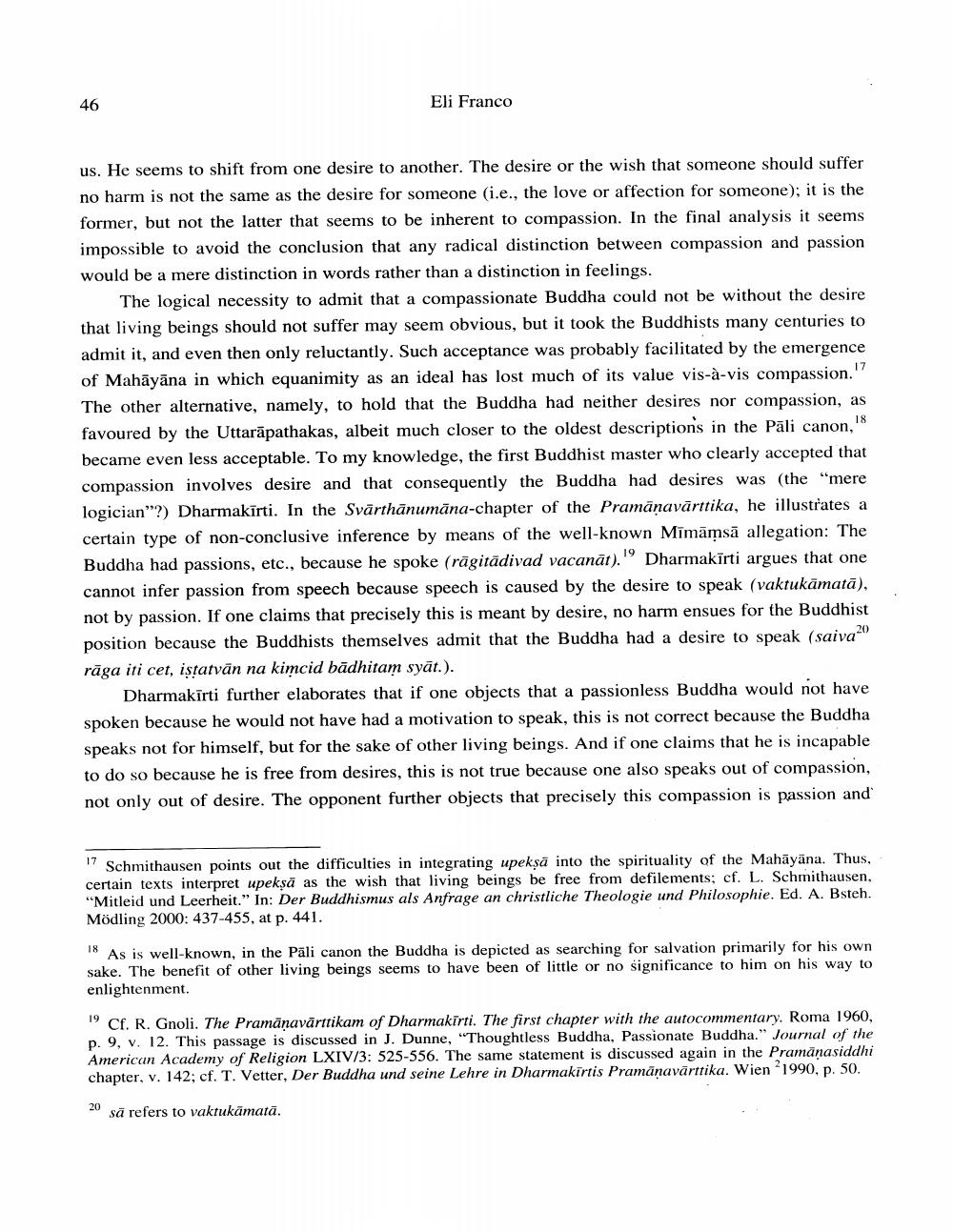Book Title: Did Buddha Have Desires Author(s): Eli Franco Publisher: Eli Franco View full book textPage 8
________________ 46 us. He seems to shift from one desire to another. The desire or the wish that someone should suffer no harm is not the same as the desire for someone (i.e., the love or affection for someone); it is the former, but not the latter that seems to be inherent to compassion. In the final analysis it seems impossible to avoid the conclusion that any radical distinction between compassion and passion would be a mere distinction in words rather than a distinction in feelings. 18 The logical necessity to admit that a compassionate Buddha could not be without the desire that living beings should not suffer may seem obvious, but it took the Buddhists many centuries to admit it, and even then only reluctantly. Such acceptance was probably facilitated by the emergence of Mahāyāna in which equanimity as an ideal has lost much of its value vis-à-vis compassion."7 The other alternative, namely, to hold that the Buddha had neither desires nor compassion, as favoured by the Uttarapathakas, albeit much closer to the oldest descriptions in the Pali canon,' became even less acceptable. To my knowledge, the first Buddhist master who clearly accepted that compassion involves desire and that consequently the Buddha had desires was (the "mere logician"?) Dharmakīrti. In the Svarthānumāna-chapter of the Pramāṇavārttika, he illustrates a certain type of non-conclusive inference by means of the well-known Mīmāmsā allegation: The Buddha had passions, etc., because he spoke (rāgitādivad vacanāt)." Dharmakirti argues that one cannot infer passion from speech because speech is caused by the desire to speak (vaktukāmatā), not by passion. If one claims that precisely this is meant by desire, no harm ensues for the Buddhist position because the Buddhists themselves admit that the Buddha had a desire to speak (saiva20 rāga iti cet, iṣṭatvän na kimcid badhitam syāt.). Dharmakirti further elaborates that if one objects that a passionless Buddha would not have spoken because he would not have had a motivation to speak, this is not correct because the Buddha speaks not for himself, but for the sake of other living beings. And if one claims that he is incapable to do so because he is free from desires, this is not true because one also speaks out of compassion, not only out of desire. The opponent further objects that precisely this compassion is passion and Eli Franco 17 Schmithausen points out the difficulties in integrating upekṣā into the spirituality of the Mahayana. Thus, certain texts interpret upekṣā as the wish that living beings be free from defilements; cf. L. Schmithausen. "Mitleid und Leerheit." In: Der Buddhismus als Anfrage an christliche Theologie und Philosophie. Ed. A. Bsteh. Mödling 2000: 437-455, at p. 441. 18 As is well-known, in the Pali canon the Buddha is depicted as searching for salvation primarily for his own sake. The benefit of other living beings seems to have been of little or no significance to him on his way to enlightenment. 19 Cf. R. Gnoli. The Pramāṇavärttikam of Dharmakirti. The first chapter with the autocommentary. Roma 1960, p. 9, v. 12. This passage is discussed in J. Dunne, "Thoughtless Buddha, Passionate Buddha." Journal of the American Academy of Religion LXIV/3: 525-556. The same statement is discussed again in the Pramanasiddhi chapter, v. 142; cf. T. Vetter, Der Buddha und seine Lehre in Dharmakirtis Pramāṇavārttika. Wien 1990, p. 50. 20 să refers to vaktukāmatā.Page Navigation
1 ... 6 7 8 9
